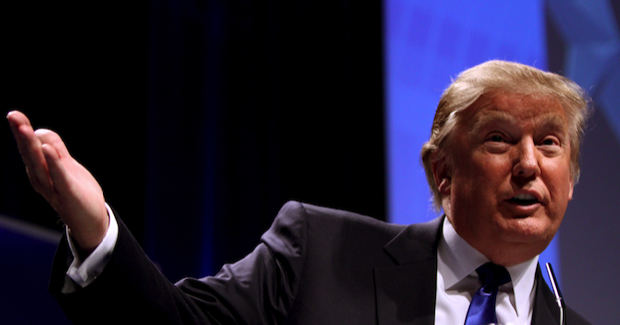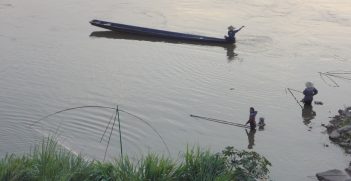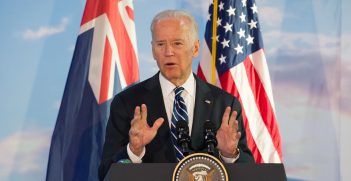European Security: Has Trump Reshuffled the Cards?

“I think NATO may be obsolete.” When Donald Trump spoke these words during the US presidential election campaign, he most likely had only a vague idea of how he would act upon them. But one thing is certain: if he made the statement, it is because he knew it to be a vote-winner. And win he did. Has his election reshuffled the cards for European diplomacy and defence?
The fact that Trump won means that his view is more than just a marginal opinion. Support for European security is much less automatic than it once was; the view that Americans are doing too much and Europeans too little is widespread. It’s an opinion underpinned by academic argument. In his 2014 book, Restraint: A New Foundation for US Grand Strategy, MIT Professor Barry Posen proposed to greatly reduce American involvement in order to force its European and Asian allies to stand on their own feet, up to the point of Germany and Japan acquiring nuclear weapons. In his view, NATO ought to be replaced with a more limited arrangement between the US and the EU, which should organise for its own defence.
The NATO alliance will not be dissolved as quickly as all that. But the criticism of Europe is far from unjustified. Take the US out of NATO, and the collective defence guarantee (Article 5) looks a lot less credible—if at all. That is why the doubt induced by Trump’s statements about NATO is so dangerous. Russia would not gear up to invade the Baltic states—that would still force all NATO allies, including the US, to unambiguously and immediately declare their military support. Putin is smarter than that. He has an interest in exploiting the vacuum that Trump’s ambiguity has created; allowing him to pursue more assertive policies in the countries wedged in between the EU/NATO and Russia.
Defence
If Europeans want their defence to be less dependent on the vagaries of US domestic politics, they need to acquire the means to achieve strategic autonomy: the ability to undertake not all, but certain military tasks alone. The EU Global Strategy (EUGS), presented to the European Council last June, puts forward exactly this objective. The way to reach it is not necessarily for Europe as a whole to spend more on defence but, first, to ensure that every EU and NATO member pays its due—the EU average of 1.5 per cent of GDP spent on defence is a real and realistic target.
Second, making full use of EU institutions and incentives, Europeans must make the leap from defence cooperation to defence integration. Instead of just making their forces interoperable with each other, they should plan as if they had a single force. Each European member would contribute national combat units, anchored in multinational corps structures with multinational command, logistics, maintenance, and training. The corollary is that all European states who join in such a scheme (hopefully at least a dozen or so) should then also do away with the many structures and units that are, in effect, useless—and therefore do not deserve to be called capabilities at all.. This would free up budgetary space to invest in the strategic enablers, which until now the US had to provide for nearly every European operation.
All of this would allow Europeans to do two things: convince the US to maintain NATO by stepping up their own contribution to collective defence, and project collective power in their own broad neighbourhood—where the Obama administration has made clear the US will no longer always solve Europe’s security problems.
Diplomacy
Diplomacy is still the preferred solution to Europe’s security challenges. Europe, through the EU, is good at diplomacy. Consider the Iran nuclear deal, which would not have happened had the EU not kept negotiations going through years of US doubt regarding Tehran. Consider also the Minsk agreement between Ukraine and Russia, brokered by Angela Merkel and François Hollande, and backed up by EU sanctions and NATO deterrence.
Would President Trump withdraw US support in both these instances? If Trump seeks to unravel the agreement with Iran, which may be a tempting symbolic act, it is highly unlikely that the EU will follow suit. The normalisation of relations with Iran is the absolute precondition for any attempt to create a dialogue between Iran and Saudi Arabia, and create a stable regional order in the Gulf.
The Obama administration was of course also trying to reach a deal, at least on Syria—that is why foreign ministers John Kerry and Sergei Lavrov met so many times. Had Hillary Clinton won, any deal on Syria still would have been one that kept Assad in place—Russia’s military intervention made that inevitable months ago. Russia too now has an interest in ending the war; it has achieved its war aim, which amounts to the preservation of the influence that it already had—it cannot achieve more, as Assad cannot be defeated but also cannot win. Trump should not fall for the temptation of paying too high a price; a Syrian deal at the cost of selling out in Eastern Europe would not be the early demonstration of leadership that he undoubtedly seeks.
Undoubtedly, the Crimea will not revert to Ukraine. The international community has tacitly recognised that and the fact that EU or NATO membership for Ukraine is not on offer. Trump may well choose to render this explicit, which from the EU point of view might be acceptable as long as the core of the Minsk agreement is upheld: Moscow must restore the control of Ukraine’s eastern borders to Kiev and end the flow of support to the separatist rebels. Europe’s aim is not to entice its eastern neighbours into a close partnership, but to uphold their sovereignty to choose for themselves whom they want to be enticed by, and to support them if that does turn out to be the EU—as is the case for Ukraine.
‘Success’ in Syria and the satisfaction of being openly recognised as a great leader by someone who also imagines himself as such, may entice Putin to conclude a deal with Trump. But it is as likely that the two prima donnas will clash. Putin may well continue to see more advantages in maintaining a ‘frozen conflict’ in eastern Ukraine, giving him a stick to beat Kiev and its allies whenever his whim or domestic popularity demand it. Doubts about Trump’s commitment to NATO may increase Putin’s greed instead of his will to compromise. And it is difficult to see how he can accept a deal on Syria that does not include his ally Iran. Trump will have to choose therefore between distancing himself from NATO and a deal with Putin, and no deal with Iran and a deal on Syria.
Nobody knows what his preference might be.
Conclusion
The election of Donald Trump has reshuffled the cards for Europe. Whether activist or isolationist, his policies will affect European interests—probably not for the better, judging by his pronouncements so far. Does it necessarily mean that the cards are stacked against Europe? No, but the EU definitely has to up its game and show a lot more resolution and unity. The prospect of Brexit has of course just rendered that even more difficult than it already was. Clearly, if and when the UK effectively leaves the EU, the remaining 27 will have a great interest in continuing to involve it in foreign policymaking. The UK however will have to accept that if it wants a ‘special relationship’ with the EU in foreign and security policy, it will have to ask for it by putting an offer on the table. One cannot slam the door and expect to be asked to return. Or do British leaders really think the special relationship with a US led by Trump will suffice to defend British interests?
Europe: up your game, or rien ne va plus.
Professor Dr Sven Biscop is director of the Europe in the World program at Egmont – The Royal Institute for International Relations in Brussels, and a professor at Ghent University.
This article is an extract from Biscop’s article in Security Policy Brief, Number 79, November 2016, titled ‘Has Trump Reshuffled the Cards for Europe?‘. It is republished with permission.





